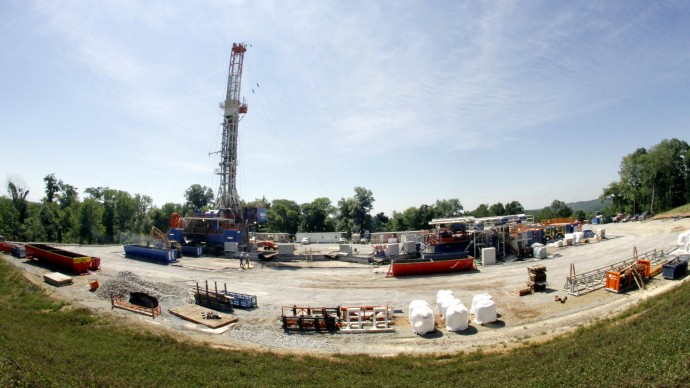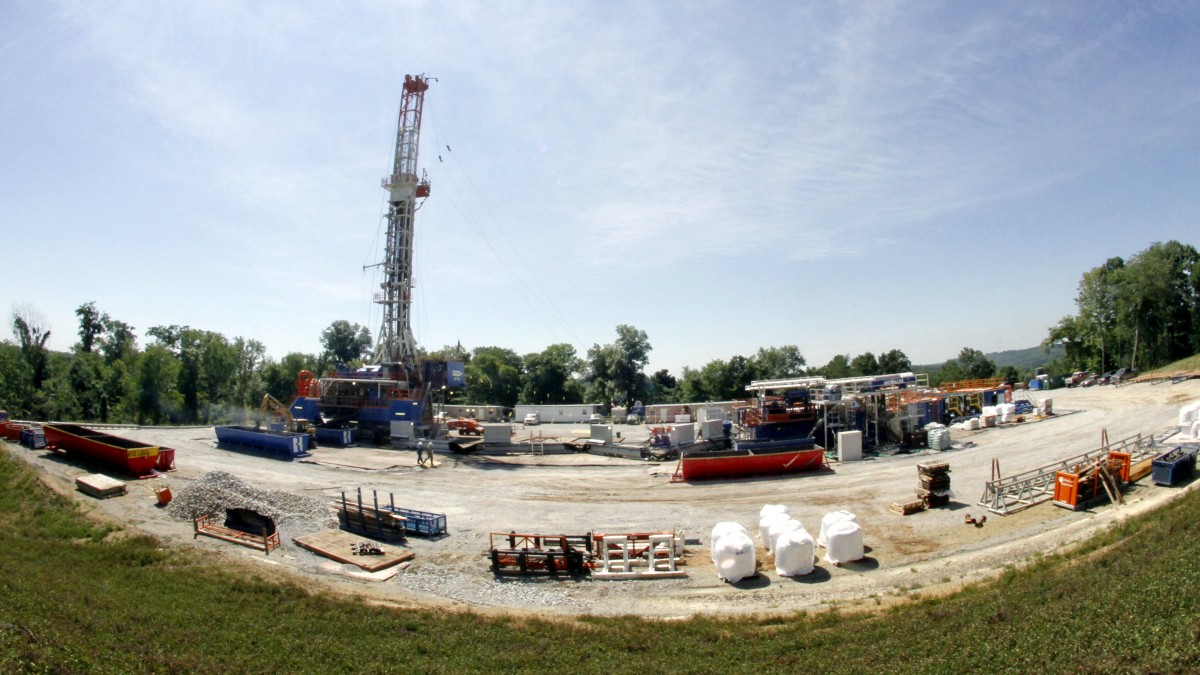
(MintPress) – Just as oil speculation plays a role in the natural gas industry, more are speculating the effects hydraulic fracturing, commonly referred to as fracking, has on human health. In February, the state of Pennsylvania passed a law that acts as a gag order on doctors who feel that a patient’s symptoms could be caused by chemical exposure from the fracking process. The legislation is just part of the secrecy surrounding the medical implications of fracking, the ever-politicized oil and gas industries and the lack of research looking into adverse health effects.
Under the Pennsylvania law, companies involved in the production of oil and natural gas will be required to provide the state with a report detailing the chemicals used when drilling for gas. The law also contains a clause that stifles doctors from disclosing certain information to patients by having doctors follow a process that requires them to contact a drilling company if they suspect a patient is affected with a chemical used with fracking and keeping it confidential, away from patients.
The Pennsylvania Association of Staff Nurses and Allied Professionals (PASNAP) say that the law prevents doctors from sharing similar information with patients being treated with symptoms that could point to chemical exposure from fracking.
Under the clause, a doctor must enter into a «verbal acknowledgment [with drilling companies] that the information may not be used for purposes other than the health needs asserted and that the health professional shall maintain the information as confidential,» according to the written legislation.
According to Stephen Miskin, a spokesman for the Republican caucus of Pennsylvania’s House of Representatives, the agreement seen in the legislation does not prevent doctors from disclosing information to patients, but rather acts as a preventative measure against information regarding the chemicals used in fracking from reaching the public. Miskin told International Business Times that a doctor telling a patient about the chemicals does not constitute informing the public.
However, Jerry Silberman, spokesman for PASNAP, says the law is clear in its intention in that if a doctor suspects a patient’s illness is due to chemical exposure from fracking, the doctor is not legally allowed to inform the patient of those suspicions, thus acting as a gag order.
Silberman says the move is an advantageous political deal for the natural gas industry with Republican Pennsylvania governor Tom Corbett.
“The motivation of the law was to repay the biggest campaign donors of governor [Tom] Corbett and give the gas industry a sense of carte blanche from the state,” Silberman said in an interview with MintPress. “To allow them to keep as much as possible; keep secret the chemicals they use and also the chemicals that are produced by their process that are not part of their initial process.”
According to VoteSmart, the oil and gas industries were the third-largest campaign contributors for Corbett, kicking in nearly $60,000 during the 2010 election cycle.
Secrecy of the chemicals used in fracking has also become an issue in Wyoming, as an environmental group is calling for a full, detailed report of chemicals used that the state qualifies as confidential commercial information.
«There are 150 chemicals in Wyoming that these companies have asked to be protected under trade secret status,» Steve Jones, watershed program protection attorney for the Wyoming Outdoor Council, told Reuters. «Since these chemicals pose a potential threat to ground water and to people’s heath, we need to know what they are.»
During the fracking process, drills penetrate deep into the earth and inject pressurized fluid, creating tiny explosions that release gas trapped inside shale rock. The contents of the pressurized fluid are what raise concerns, as potentially carcinogenic chemicals could leak or escape and make their way into underground sources of drinking water.
But reporting of those chemicals from drilling companies fails to produce thorough accounts of what is being injected into the ground and what byproducts are seen as a consequence. A National Public Radio (NPR) story details a convoluted and complicated pollution data aggregation system used by drilling companies and noted that because many of these individual drilling operations are small, they do not meet the threshold of required pollution reporting.
«The Clean Air Act requires reporting of emissions so that the government can collect the [toxic emissions] data from facilities of a certain size,» reporter Abrahm Lustgarten told NPR.
«The oil and gas facilities often fall under that threshold and an exemption allows them not to be aggregated or counted together. Because these facilities are small, there is no obligation to report to federal authorities what pollutants might be emitted from those facilities … which means there’s no information to paint a bigger picture of what communities are dealing with.»
The Case for Disclosure
The ethics of disclosing relevant medical information to patients is set at a high standard within the profession. Restrictions about what doctors can tell patients who may have medical conditions related to fracking chemicals goes against what is taught in medical schools. The tug-of-war between legislation and common medical practices creates a grey area for the practice.
The University of Washington School of Medicine notes there are two main ethical situations when it is justifiable for a doctor to withhold a truth from a patient. The first relates to patient safety and predictable harm, such as a diagnosis that would make a depressed patient actively suicidal. The second instance is if the patient gives prior instructions stating their preference to not be told the truth.
The Ethics in Medicine division of the school explains that all knowledge of a patient’s condition be shared by the doctor with said patient.
“Patients should be told all relevant aspects of their illness, including the nature of the illness itself, expected outcomes with a reasonable range of treatment alternatives, risks and benefits of treatment, and other information deemed relevant to that patient’s personal values and needs,” according to the school.
Silberman said the practice of holding a medical practitioner to a confidentiality clause is immoral and can harm the patient.
“This is a huge violation, in our view, of medical ethics. First of all, it delays treatment. If you suspect there is a poison or some chemical and have to go get a verbal agreement or written agreement, it delays treatment while you’re trying to figure out what’s going on,” Silberman explained. “If the doctor has to keep it confidential, then he cannot tell the patient. And the patient is not bound by confidentiality, so the doctor cannot tell them what’s going on.”
Health risks
Little has been done to research what particular health affects the fracking process has on humans. While few independent studies have looked into the known chemicals used for the natural gas extraction, most provide vague side effects with little detail. In mid-March, the New York State Assembly called for a health impact study of fracking, saying it was necessary to understand what health effects are being seen in other states, the health of the employees and its impact on the health care system.
As fracking becomes a more popular industry in upstate and downstate New York, health concerns have been questioned more frequently. As it turns out, very few studies have even looked into the issue.
«We have county medical societies throughout upstate and downstate that are very concerned that the health impacts have not been studied,» said Pat Clancy, vice president for public health and education at the Medical Society of the State of New York.
That’s not to say research has been done sparingly. A 2010 study titled “Natural Gas Operations from a Public Health Perspective” claimed that the extraction of natural gas can use up 944 products that contain 632 different chemicals. Of a sample taken of those chemicals, it was discovered that 75 percent of them could affect the skin, eyes and the respiratory and gastrointestinal systems. Around 40-50 percent had the potential to harm the brain and nervous system; immune and cardiovascular systems and 25 percent could cause cancer and cell mutations.
According to EarthWorks, 71 fracking chemicals currently used are associated with 10 or more health side effects. Most of those side effects are also noted in the aforementioned study.
A 2001 toxicology study looked at four of the most dangerous volatile organic compounds (VOCs) of natural gas extraction. The report, “Toxicology and human health effects following exposure to oxygenated or reformulated gasoline,” noted that chemicals such as benzene, toluene, ethyl benzene and xylene can be associated with neurological problems, birth defects and cancer.
John Suggs, managing director of the nonprofit Environmental Health Project, told the International Business Times that nearly 100 people have shown up at his Ohio facility saying that the medical attention they need is because of fracking. For this reason, Suggs said that if doctors are forced to keep these instances confidential, then they run the risk of not being able to report a public health hazard.
«What would happen down the road, if several people who’ve agreed on nondisclosure have identical symptoms? Might that become a public health issue that might require additional disclosure?» Suggs questioned.
Source: MintPress


